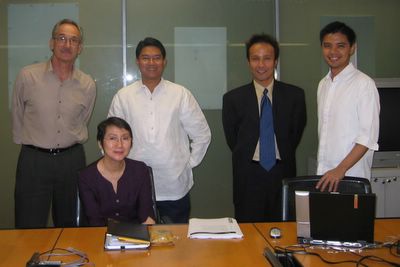People come up to me with interesting questions all the time. Each Friday, I'll pick a question to answer. This week's question comes from Joey Alarilla of inq7.net.
"Why did you decide to join the government after 20 years in the private sector?"
First of all, it was a chance to work for
a fantastic boss. (Hi sir, I hope you're reading this ;-)
Second, I felt it was time to focus my talents on helping the country. I felt tired of working for my own goals. I was looking for a challenge -
a chance to contribute to the country. I prayed together with my wife and family, and we made a joint decision that the timing was right. There was an opening on the CICT, and my talents and work experience seemed an excellent fit for the position.
Third, I asked my colleagues in the private sector whether they would support me if I ever accepted the job.
Industry support came from the ITFP (IT Foundation of the Philippines), ITAP (IT Association of the Philippines), PCS (Philippine Computer Soceity), and BPAP (Business Processing Association of the Phillippines).
Finally, public service is a
family tradition. My sister Mardi Mapa-Suplido is one of our country's chief peace negotiators. My brother Cidni Mapa is a councilor in Tanjay City, Negros Oriental.
My maternal grandfather, Dr. Cesar Ongpin, was assigned to the Department of Health's army hospital in
Bataan at the time of its surrender. Thank God, he survived the 1942 Death March. He traded his silver coin collection with a Japanese guard for a chance to escape. Others were not so lucky.
My father, Domingo Mapa, worked briefly for the Philippine International Trading Corporation. My mother, Lirio Ongpin-Mapa, worked for some time with DTI's Bureau of Domestic Trade.
My other relatives who served in our government: Victorino Mapa (Chief Justice of the Supreme Court from 1920-1921), Placido Mapa Sr. (Agriculture and Natural Resources Secretary, 1949-1953), Placido Mapa Jr. (Economic Planning Minister, 1981-1983), Roberto Ongpin (Trade and Industry Minister, 1979-1986), and Jaime Ongpin (Finance Secretary, 1986-1987).
So you could say it's in the blood.
Keep those questions coming! Or I'll have nothing to post on Fridays ...





